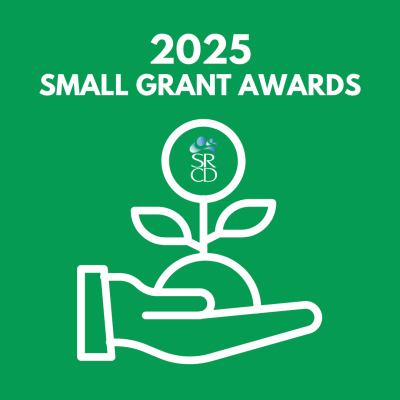Small Grants Program for Early Career Scholars
The Small Grants Program for Early Career Scholars, launched in 2018, reflects SRCD’s commitment to supporting the scholarship of tomorrow’s leaders. Thank you for you interest in the 2025 Small Grant Awards opportunity. The submission deadline was Friday, February 7, 2025.

Supporting the Next Generation of Scholars
The years immediately following the completion of a doctoral degree are critical for scholars launching their own independent program of research. However, availability of funding required to build a new research program through exploratory, pilot, or extension research varies depending on the position and institution of the researcher.
One facet of SRCD’s Strategic Plan is capacity building, hence, it is crucial to support the next generation of scholars and build the future of developmental science.
The Small Grants Program for Early Career Scholars launched in 2018 and, along with SRCD’s Dissertation funding awards, reflects SRCD’s commitment to supporting the scholarship of tomorrow’s leaders.
Non-renewable grants of up to $7,500 USD are available on a competitive basis for research projects conducted by early career members who completed their degrees in the past five years, regardless of their appointment, institution or country of residence. Please note that, for the 2025 cycle, eligibility has been extended for one additional year (due to possible COVID-related research delays). Applicants will be eligible if they completed their doctoral degree January 1, 2019 or later.
The funding priorities for these grants include a proposed project that:
- Exemplifies exceptional scientific merit,
- Will contribute to the applicant’s competitiveness for external funding and/or career advancement, and
- Furthers SRCD’s strategic goals.
2025 Call for Submissions
Eligibility and Evaluation Criteria
Applicants must be SRCD members conducting child development research and must have completed their doctoral degree (or equivalent) no earlier than January 1, 2019 and/or will have completed the degree no later than June 1, 2025. Proposals are welcome from eligible applicants regardless of the nature of the appointment (faculty, post-doc, research scientist, etc.), type of institution, or country of residence, provided that the employer has the infrastructure to oversee fund dispersal and IRB/IACUC (or equivalent) review. We especially encourage applications from those based in international institutions and/or those who are conducting research in under-represented countries.
Proposals from eligible applicants (see above) will be reviewed for:
- Scientific merit (including degree of innovation and feasibility),
- Impact of the funds on the applicant’s research program/professional development, and
- Relevance of proposed activity to SRCD’s strategic goals.
Proposal materials
- Application Form (application portal)
- Description of proposed research (Microsoft Word). Criteria includes:
- A limit of 1000 words, excluding references,
- Overview of research question, motivation, and hypotheses,
- Description of method or approach and proposed analysis plan
- Timeline of proposed research activities,
- Anticipated impact of the grant (e.g., pilot data for a grant proposal, publishable manuscript; placement or promotion of the applicant), and
- Relevance of proposed activity to SRCD’s strategic goals.
- Itemized budget and budget justification (PDF or Microsoft Word)
- Please list each budget item with an accompanying explanation about how the budget expense (item per item) will be used to help with the completion of the project. Be sure to justify all expenses (no minimum, maximum of $7,500 USD). Also, please provide any other sources of funding for this project.
- Note regarding budget: The award must be used to support expenses that are directly needed for the completion of the project (e.g., equipment/software, participant incentives, travel for data collection). It may not be used for personal expenses (i.e., personal travel or salary), training experiences, or for travel to conferences to disseminate research findings (i.e., cannot be used to cover costs associated with travel to SRCD Biennial Meeting or other conferences). All expenses must be justified as needed for the completion of the project. Please also be aware that SRCD does not pay for indirect costs associated with institutions.
- CV (PDF or Microsoft Word)
- CVs are required for every Principal Investigator (PI). PIs must be early career scholars and SRCD members.
- For collaborative proposals, please also include the CVs of all Co-Principal Investigators (Co-PIs). Co-PIs must be early career scholars.
- Non-early career collaborators may be included in the project description and/or budget as consultants or senior advisors. Their CVs are not required.
All components of the proposal package must be submitted through the application portal for the proposal to be reviewed. Applicants can expect a decision notification email in late April 2025.
***The deadline for 2025 submissions was Friday, February 7, 2025. Stay tuned for more information.
For inquiries, please contact scholar@srcd.org.
2025 Call for Reviewers
Reviewer eligibility:
- Reviewers must have obtained a doctoral degree (or equivalent) in the developmental sciences or a related field.
- We encourage reviewer applications from scholars from countries outside of the United States, particularly lower and middle income countries.
- We also encourage reviewer applications from scholars who are underrepresented in the developmental sciences.
**Note: SRCD membership is NOT required.**
Given the wide range of research areas covered in the applications year-to-year, we are looking for reviewers from diverse areas of expertise within developmental science/human development. See a list of key research areas here. With that said, we typically struggle finding reviewers with expertise in the following research areas: Biological Processes (Neuroscience, Genetics, Psychophysiology), Cognitive Processes, and Perceptual, Sensory, Motor Processes.
Small Grants reviewers will be expected to review eight to ten 1,000-word applications from late February to late March. We ask potential reviewers to fill out an Interest Form (linked below) to help our office best match reviewers’ expertise with the applications should they be selected to serve. Please note that filling out the Interest Form is not a formal commitment to review.
***The deadline to complete the 2025 Small Grant Reviewer Interest Form concluded on Friday, February 7, 2025.